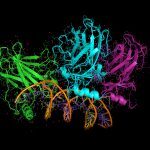Link to Pubmed [PMID] – 25124723
Link to DOI – 10.1093/toxsci/kfu162
Toxicol Sci 2014 Nov; 142(1): 196-209
Methotrexate (MTX) is used for rheumatoid arthritis (RA) treatment showing a wide toxicity profile. This study aimed to evaluate the influence of single nucleotide polymorphisms (SNPs) in genes encoding for MTX transporters with the occurrence of MTX-related toxicity (overall and gastrointestinal). A total of 233 Portuguese RA patients were genotyped for 23 SNPs. Haplotype analyses were performed and a toxicogenetic risk index (TRI) was created for SNPs that revealed to be statistically significant. Regarding MTX overall toxicity, an increased risk was associated to SLC19A1 rs7499 G carriers (p = 0.017), SLC46A1 rs2239907 GG (p = 0.030) and, SLCO1B1 rs4149056 T carriers (p = 0.040) and TT (p = 0.019). TRI revealed that patients with Index 3 were 18-fold more likely to present an adverse drug reaction when compared to those with Index 1 (p = 0.001). For MTX gastrointestinal toxicity, results demonstrated an increased risk associated with SLC19A1 rs7499 G carriers (p = 0.012) and GG (p = 0.045), SLC19A1 rs1051266 G carriers (p = 0.034), SLC19A1 rs2838956 A carriers (p = 0.049) and, SLCO1B1 rs4149056 T carriers (p = 0.042) and TT (p = 0.025). Haplotype analyses showed association between GGAG haplotype for SLC19A1 rs7499, rs1051266, rs2838956 and rs3788200 with MTX gastrointestinal toxicity (p = 0.029). TRI revealed that patients with Index 4 were 9-fold more likely to present a gastrointestinal disorder when compared to those with Index 1 (p = 0.020). This study demonstrated that SLC19A1, SLC46A1 and SLCO1B1 genotypes may help to identify patients with increased risk of MTX-related overall toxicity and that SLC19A1 and SLCO1B1 genotypes, and SLC19A1 haplotypes may help to identify patients with increased risk of MTX-related gastrointestinal toxicity.

